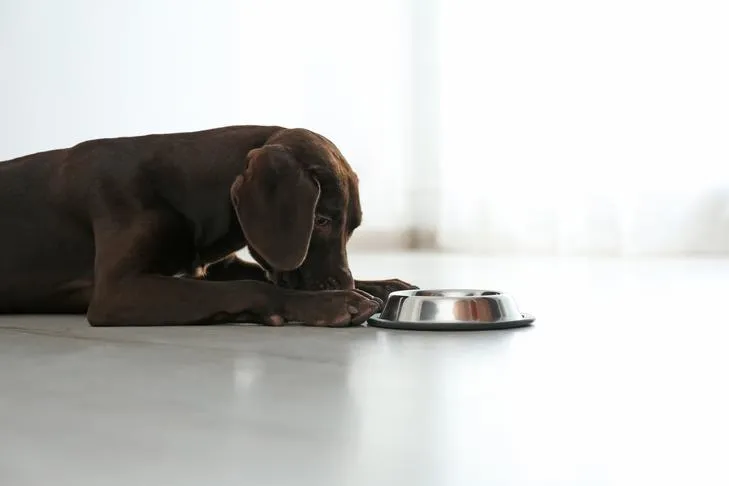Feeding a sick dog, especially one dealing with a decreased appetite, upset stomach, diarrhea, or vomiting, can be a source of stress for any pet parent. While consulting your veterinarian is always the first and most crucial step when your dog experiences an upset stomach, a bland diet can often help alleviate some of these symptoms. This approach provides your dog with essential nutrition for recovery while being gentle on their digestive system.
Just like humans, dogs can occasionally experience an upset stomach, manifesting as symptoms like gas, nausea, constipation, or diarrhea. It’s vital to remember that these symptoms can sometimes indicate a more serious underlying health issue. Therefore, always seek advice from your veterinarian before attempting any home treatments or dietary changes. These recipes are specifically intended for dogs with mild stomach upset, after other potential health risks have been ruled out and your dietary plan has been discussed with your vet. Remember that senior dogs or those with existing conditions like diabetes, cancer, or allergies may require specialized nutritional support.
Best Foods for Dogs With Upset Stomachs
When your dog is dealing with a mild upset stomach, offering easily digestible and bland foods can provide significant relief. These options are generally well-tolerated by dogs with sensitive stomachs, deliver key nutrients, and can help regulate appetite and bowel movements. If you’re wondering what table foods are safe for dogs when they’re not feeling well, these are excellent starting points.
Boiled Chicken and Rice
Chicken and rice are staple ingredients in many commercial dog foods for good reason: they are mild and easily digested, making them ideal for upset canine stomachs. This bland meal is also simple to prepare. You’ll need boneless, skinless chicken breasts and white rice. While brown rice offers more nutritional value, white rice’s blandness is preferable for a sensitive stomach.
It’s crucial to avoid adding oils, butter, or any seasonings, as these can further irritate your dog’s stomach and worsen their condition. Stick to plain boiled chicken and rice. Ensure the chicken is thoroughly cooked and then shred or cut it into small, bite-sized pieces suitable for your dog. For convenience, you can also find pre-packaged chicken and rice meals specifically formulated for dogs.
Shredded Chicken
Plain, unseasoned, boiled shredded chicken is not only gentle on an upset stomach but can also act as an incentive for dogs with a decreased appetite to eat. It’s easy to digest and packed with essential vitamins, minerals, fats, and amino acids, making it a highly beneficial choice for dogs feeling unwell. Cooked chicken can be stored in the fridge for 3–4 days or frozen for 2–6 months, making it a convenient option for future use.
 A sad Beagle laying down next to a full bowl of kibble, indicating a lack of appetite.
A sad Beagle laying down next to a full bowl of kibble, indicating a lack of appetite.
Plain Pumpkin
Incorporating unseasoned pumpkin into your dog’s diet can offer notable digestive health benefits. Pumpkin is rich in fiber, which aids in regulating the digestive system. Cooked, peeled, unsalted, and unseasoned pumpkin contains beneficial ingredients like vitamin E, iron, and potassium, providing a nutritional boost and supporting digestive health. This natural remedy is often recommended by veterinarians to help regulate mild constipation.
Typically, veterinarians suggest one to four tablespoons of pumpkin, depending on your dog’s size. Canned pumpkin (pure pumpkin puree, not pie filling) is a convenient alternative to preparing fresh pumpkin, as long as it’s completely unseasoned. Feeding your dog pumpkin pie filling, with its spices and sugars, could exacerbate stomach irritation and lead to further complications. For additional support, specialized pumpkin supplements designed for dogs are also available to add to their food.
 A Cavalier King Charles Spaniel puppy stands next to its food bowl at home, looking expectantly.
A Cavalier King Charles Spaniel puppy stands next to its food bowl at home, looking expectantly.
Bone Broth
Bone broth is a very mild, liquid meal that is easily tolerated by upset canine stomachs. It also serves as an excellent way to add moisture and flavor to dry food, encouraging dogs with reduced appetites to consume their meals. To prepare a safe bone broth for dogs, fill a slow cooker with beef marrow bones or bones rich in joints, such as turkey or chicken legs. Cover the bones with two to three inches of water, cover the cooker, and cook on low for 20 to 24 hours.
After cooking, allow the broth to cool in the fridge, which will enable the fat to form a hardened layer on top. Carefully scoop off this fat layer and store the jelly-like broth in the refrigerator. If you plan to use the broth to moisten dry food, microwave it just enough to transform it from a semi-solid jelly back into a liquid, ensuring it’s not too hot to avoid burning your dog’s mouth. For future use, you can freeze portions of the broth in small containers or an ice cube tray.
While bone broth is packed with nutrients from bone marrow, it is crucial to remember that cooked bones themselves can be highly dangerous for dogs. Always make sure to remove all bones from your broth before serving. Straining the broth thoroughly will help ensure no small bone fragments are missed, protecting your dog from potential choking hazards or internal injuries.
 A German Shorthaired Pointer puppy resting next to its food bowl indoors, looking calm.
A German Shorthaired Pointer puppy resting next to its food bowl indoors, looking calm.
Meat-Based Baby Food
Certain types of baby food are frequently utilized in veterinary emergency hospitals for feeding dogs under their care. Its exceptionally easy-to-swallow and digest consistency makes it an excellent vehicle for administering oral medications. Consider feeding Stage II meat-based baby foods, such as chicken, lamb, or turkey, provided they are free from ingredients or additives that could be toxic to dogs, including garlic or onion powder. Always read the label carefully to ensure no harmful ingredients are present.
Foods to Avoid When Your Dog Has an Upset Stomach
While some human foods can be beneficial for soothing your dog’s upset stomach, many others can exacerbate their condition or even be dangerous. It’s imperative to avoid feeding your dog the following items, especially when they are experiencing digestive issues:
- Foods cooked with garlic, oils, or seasonings: These can irritate a sensitive digestive system.
- Milk or dairy products: Many dogs are lactose intolerant, and dairy can lead to vomiting or diarrhea. If you’re wondering what does cheese do to a dog when they have an upset stomach, it’s best to avoid it.
- Processed meats: Items like ham, bacon, or pepperoni are often rich, fatty, and high in salt, all of which can severely upset a dog’s stomach. Furthermore, if you’re concerned about what meat should all dogs avoid, highly processed and fatty meats are definitely on the list.
- Certain fruits and vegetables: While some are safe, many common fruits and vegetables can be toxic or hard to digest. For example, if you’re curious about what fruits should a dog not eat, it’s best to stick to vet-approved options.
Remember: these dietary adjustments are not a substitute for proper medical care. However, introducing a bland diet can significantly alleviate some of your dog’s intestinal discomfort and provide them with palatable, easy-to-digest foods. When in doubt or if symptoms persist, always consult your dog’s veterinarian before making any changes to their diet or continuing with home remedies. Your vet can provide an accurate diagnosis and the most appropriate treatment plan for your beloved companion.
